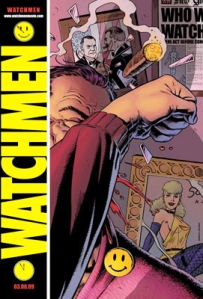 A recent court ruling sent tremors through the fan communities this week, when a federal judge held that Fox’s lawsuit against Time Warner could move forward over the rights to produce and distribute the Watchmen movie. I’ve already had a couple of friends in the industry ask me about it, since I taught copyright law at university for several years in addition to my current work in comics, and the centipede crawl of court proceedings can be notoriously maddening for people who just want to find out what the hell is going on.
A recent court ruling sent tremors through the fan communities this week, when a federal judge held that Fox’s lawsuit against Time Warner could move forward over the rights to produce and distribute the Watchmen movie. I’ve already had a couple of friends in the industry ask me about it, since I taught copyright law at university for several years in addition to my current work in comics, and the centipede crawl of court proceedings can be notoriously maddening for people who just want to find out what the hell is going on.
It doesn’t help that this case involves both copyright–one of the most complicated areas of law, because it’s about property that doesn’t physically exist–and Hollywood contracts, which were invented by jacket-strapped lunatics clenching nubs of graphite between their teeth as they scrawled out Cthulhu-summoning rituals on the padded walls of their asylum cells.
Think the Watchmen graphic novel was complex? That Rorschach was crazy? That Ozymandias’s plan represents the labyrinthine scheme of a delusional megalomaniac?
Ha ha ha. You’ve never read a Hollywood contract. Watchmen is a Johnny DC pop-up book compared to a Hollywood contract.
I won’t bore anyone with the details of the ins-and-outs and option transfers and bankruptcies and quitclaims and all the things about law and litigation that make people want to chase the Comedian down the outside of a skyscraper. People just want to know what the hell is going on. So:
 As we all know, Time Warner has finally produced a Watchmen movie, after years of well-publicized green lights and false starts and directors and scripts and producers and studios. In all of those twists and turns on the Hollywood rollercoaster, fans mostly preoccupied themselves with their rising expectations and crashing disappointments, not realizing that all the while, the rights to the film were getting sliced up, passed around, recombined, cast away, recycled and passed around again.
As we all know, Time Warner has finally produced a Watchmen movie, after years of well-publicized green lights and false starts and directors and scripts and producers and studios. In all of those twists and turns on the Hollywood rollercoaster, fans mostly preoccupied themselves with their rising expectations and crashing disappointments, not realizing that all the while, the rights to the film were getting sliced up, passed around, recombined, cast away, recycled and passed around again.
At some point late in the game, Time Warner believed it had finally stitched them all back together, and gave the go-ahead to produce the film. But Fox, involved in the slicing-up and passing-around at some point in time, believes it still owns a shred of the original rights–and perhaps the most important shred, like that one piece of newspaper clipping that finally lets you solve the crossword puzzle. Whether it actually owns that puzzle piece will now be up to the court to decide.
Fox, as is typical in such cases, waited until the film went well into and even past production before pressing its litigation, a strategy designed to encourage settlement in the same way that a shotgun encourages marriage; the last thing that Time Warner wants is for the film to be in litigation at the same time that it’s trying to market and release it.
 This isn’t to describe Fox’s legal position as right or wrong, or its tactics as good or bad. It’s to say that what Fox really wants is not to stop the movie’s release, burn the negative and film its own opus; but to get its fingers on a slice of the pie. For a film whose trailer alone generated 900,000 new copies of the graphic novel, that’s hardly a surprise.
This isn’t to describe Fox’s legal position as right or wrong, or its tactics as good or bad. It’s to say that what Fox really wants is not to stop the movie’s release, burn the negative and film its own opus; but to get its fingers on a slice of the pie. For a film whose trailer alone generated 900,000 new copies of the graphic novel, that’s hardly a surprise.
In that respect, fans should be encouraged that nothing about this litigation will realistically keep the movie out of theaters next year. At the end of the day, Fox wants money; it doesn’t want an unreleased and unreleasable film canister.
And, yes–while it’s true that Fox has also filed for an injunction to shut down the film’s release, that too should give the fans no alarm. It is, like Fox’s other maneuvers, just a negotiating tactic; a successful injunction simply represents the fastest way since God invented light of getting a settlement offer on the table.
I do know that Fox’s attorney’s say they’re not looking for cash; that copyright infringement is a serious matter and they’re litigating the entire thing to enforce their rights and their principles. But I think we have to call shenanigans on this one; if that were the case, then they’d have filed their lawsuit sometime well before this past February.

Rorschach: No patience for shenanigans.
OK, so: what actually happened at this court proceeding, and what does the ruling mean?
Time Warner had filed a pre-trial motion to dismiss the case, arguing that no reasonable interpretation of the law could give Fox a hope of winning, even if everything that Fox claimed was true about how the film’s rights were cut up and reassembled.
 In other words, it’d be a waste of the court’s time to hold a trial, like a wrongful death case where there’s no allegation that someone even died; there’d be no argument imaginable that could make the case turn the corner.
In other words, it’d be a waste of the court’s time to hold a trial, like a wrongful death case where there’s no allegation that someone even died; there’d be no argument imaginable that could make the case turn the corner.
These type of motions get routinely filed in the early stages of almost every type of litigation, and they’re just as routinely rejected. They’re usually filed as a Hail-Mary shot in the dark, since the procedure exists primarily to get rid of frivilous, bullshit lawsuits, or where one side just can’t see that it’s so plainly wrong. If there’s really any reasonable question or possibility of doubt, the judge will reject the motion and let the case go forward; because, as the saying goes, everybody deserves their day in court.
To decide that, the rules of these motions require the judge to pretend, just for this one ruling, that the target of the motion has already proven all of its claims to be 100% true. And, if after imagining that everything you claim is automatically true, the judge still thinks you couldn’t reasonably win, then–as another saying goes–you don’t have a case.
As you might imagine, that’s often an incredibly difficult standard to beat when a case is not so obviously a bullshit lawsuit, and that’s what happened here: the judge ruled that, if we give Fox the benefit of every doubt, there just might be a case in there.
 What the judge didn’t rule, and usually never rules on at this stage in the game, is whether Fox actually deserves the benefit of those doubts. Whether its claims are actually true or not is something that wouldn’t get decided until a trial.
What the judge didn’t rule, and usually never rules on at this stage in the game, is whether Fox actually deserves the benefit of those doubts. Whether its claims are actually true or not is something that wouldn’t get decided until a trial.
Granted, lawyers who successfully defend against these routine motions, especially in well-publicized cases, will almost always spin the ruling as if it means the veracity of their case has been written in stone by a fiery bush from Heaven, complete with Charton Heston and Yul Brynner and a special effects ride from Universal Studios. But in doing that, they’re just trying to amplify the public perception of their case; it doesn’t actually mean their client’s claims are more likely to be true.
So, if these motions are generally pointless, why do lawyers file them? Well, some would say that’s like asking why bears shit in the woods; but the truth is, they’re pretty easy to do, you never really know what a judge might rule, you don’t want to get sued for malpractice, and hey, might as well give it a shot, you could get lucky. People buy lottery tickets all the time.
But what does happen occasionally, however, is that the court will rule on something that actually affects the posture of the case down the line. For example: if the authenticity of a document is in dispute, the judge might rule that, pretending the document has been proven 100% authentic (as the rules of the motion require him to do), it would be overwhelming evidence that one side is right (or wrong). Then the lawyers know that the real target of the trial will be proving whether that document is authentic or not.
 There’s something similar (different in specifics, but along the same theme) that happened here. The court ruled in a way that at least on the surface appears to give added staying power to the veracity of Fox’s claims. Again, the details are boring, but the decision helps provide a trail map for the Blair Witch journey that the rights to the film have taken–and for Fox, that’s a very good thing.
There’s something similar (different in specifics, but along the same theme) that happened here. The court ruled in a way that at least on the surface appears to give added staying power to the veracity of Fox’s claims. Again, the details are boring, but the decision helps provide a trail map for the Blair Witch journey that the rights to the film have taken–and for Fox, that’s a very good thing.
Said another way: the ruling itself (rejecting the motion) isn’t all that notable; but the content of the ruling looks like it gives Fox a helluva lot to work with.
It should be noted that this very same judge presided over a similar case relating to the Dukes of Hazzard film three years ago, so he’s well up on the laws and issues involved. In that case, he issued an injunction against Time Warner, and the case was almost immediately settled.
Obviously, Watchmen is a film with a much different history, and certainly a much different financial scope, and Fox a much different plaintiff. But my guess is that pretty soon–at least well before the release date to resolve any uncertainty–we’re going to hear an announcement about a settlement compromise one way or another, and everyone’s concerns about the curtain going up on schedule will blow away like Rorschach’s atoms in the snow.
 Because Time Warner knows that when it comes to big-ticket litigation: In the end, nothing ever ends.
Because Time Warner knows that when it comes to big-ticket litigation: In the end, nothing ever ends.
Related posts:











